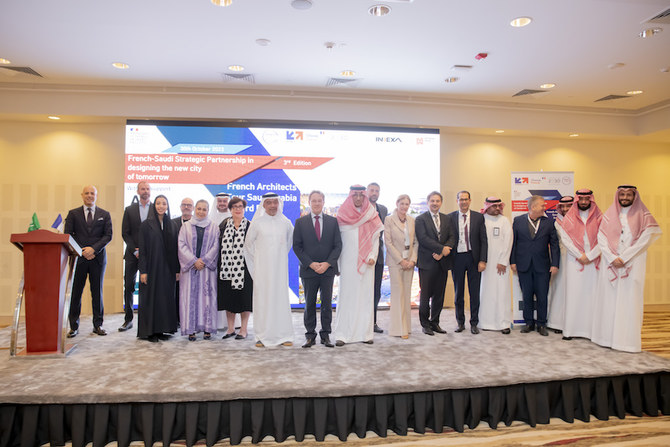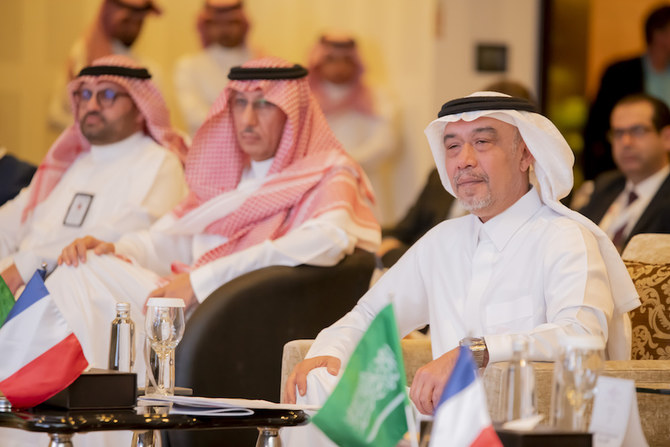RIYADH: A delegation of architects representing 30 French firms on Monday gathered in Riyadh for a symposium to explore the potential for strategic partnerships in the sector in line with Vision 2030.
The event, organized by AFEX and Business France, was part of the third French-Saudi Strategic Partnership under the theme, “Shaping Cities for Tomorrow.”
Saudi Arabia’s investment in megaprojects, infrastructure, urban planning, and landscape design aims to fuel its growth potential and increase its attractiveness in terms of foreign direct investment, tourism, hospitality, and recreational and sports activities.
In his opening speech, Ludovic Pouille, the French ambassador to the Kingdom, said: “The doors of opportunities in Saudi Arabia are wide open. The world is here (in Saudi Arabia), and the competition is high, but you have great assets in your hands, to contribute to the Kingdom’s development. The opportunities for French and Saudi collaborations are limitless.
“Vision 2030 positions Riyadh as one of the most attractive cities on the world map. Today we proudly support KSA’s bid to host Expo 2030 — for megaprojects, no one does it better than Saudi companies,” he added.
The Ministry of Municipal and Rural Affairs and Housing (MOMRA) has become an active player in creating vibrant communities that reconcile tradition and modernity, growth and sustainability.
Ihab Hashani, MOMRA deputy minister, said: “Our objective is to create space that encourages community living and smart mobility under MOMRA 2.0.”
He noted that it would follow a set of guidelines that represented the history of the country’s cities and preserve their identity, while working closely with municipalities to ensure implementation.
Reda Amalou, AFEX’s president, said: “The implementation and the concretization of Vision 2030 is striking — Crown Prince Mohammed bin Salman opened the economy to the world while preserving the country’s tradition.”
Amalou highlighted AlUla as a successful model for French-Saudi cooperation, and the necessity for AFEX to maintain the momentum of sharing expertise and contributing to the architecture scene in Saudi Arabia.
In March, a memorandum of understanding was signed between AFEX and the Architecture and Design Commission, actively participating in youth development under Vision 2030 and providing vocational training opportunities for young Saudi professionals at French firms in France.
French architecture resonates with, but is not limited to, heritage preservation and luxury. Education, health, and ecotourism are some of the fields showcasing French expertise leaving room for potential future collaborations.
Mohammed Darwish, strategic partnership and international relations manager at the Diriyah Gate Development Authority, pointed out that Diriyah was an important example of how to build the “city of the future” while preserving heritage.
He said: “Inaugurated in 2019, the Diriyah project is in harmony with the area. Diriyah is directly linked to Riyadh city, KAFD (King Abdullah Financial District), and the new Murabba project, connecting tradition to modernity and the development of the city.”
Saudi Arabia is raising the sustainability bar, placing it at the center of decision making. Jayne McGivern, CEO of the Sports Boulevard Foundation, said in joining Wadi Hanifa to Wadi Al-Sulai, the Sports Boulevard was the first megaproject to be sustainable and environmentally conscious at a 360-degree level.
“A linear park with real estate across it, we’re transforming a former utility corridor, reinstating the red sands desert that Riyadh is famous for and aiming to achieve carbon neutrality by 2040,” she added.
Creating green neighborhoods with the key enablers being water and trees was considered the future of the city.
Donald Sharp, design director of the Green Riyadh Program, said: “It’s about the city, it’s about creating connections, encouraging people to use public transport, and increasing the percentage of green space to improve air quality.”
Green Riyadh aims to increase green coverage from 1.5 percent to 9.1 percent, enhancing quality of life by creating open areas to improve public health, reduce energy consumption and ultimately, making Riyadh one of the 100 best livable cities in the world.
Tarek Qaddumi, NEOM’s executive director, said there was an urgency to redesign cities with “minimal footprint, hyper-connectivity and proximity, and invisible infrastructure, enabling access to more people and offering services to more people.
“NEOM is an economy with various sectors welcoming nine to 10 million people. A proud Saudi project, NEOM focuses on bringing the best talent from around the world,” he added.
During the symposium, members of AFEX, representing French architecture firms, met executives at the cutting edge of Saudi megaprojects including those representing the Diriyah Gate Development Authority, the Royal Commission for AlUla, Red Sea Global, NEOM, and Soudah Development.
The event will be followed by a series of thematic workshops diving into the cities of the future, Riyadh as the new hub of architecture, and how the private sector can meet the expectations of Vision 2030 and its iconic megaprojects.
The bid to host Expo 2030 in Saudi Arabia is another example of the architectural grandeur with Riyadh competing with Rome and Busan, with a decision expected on Nov. 28.
* This article originally appeared on Arab News en francais, click here to read it.






























